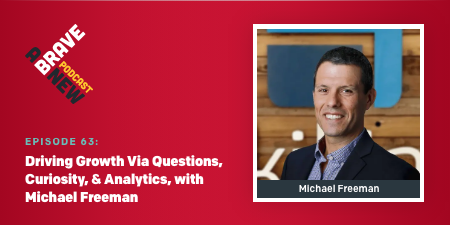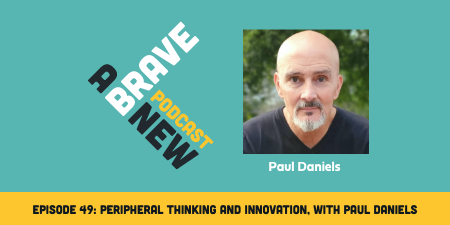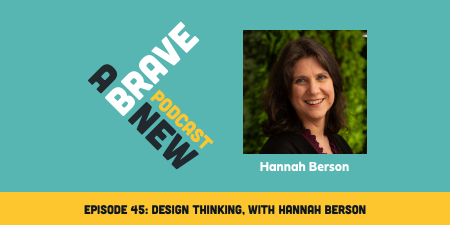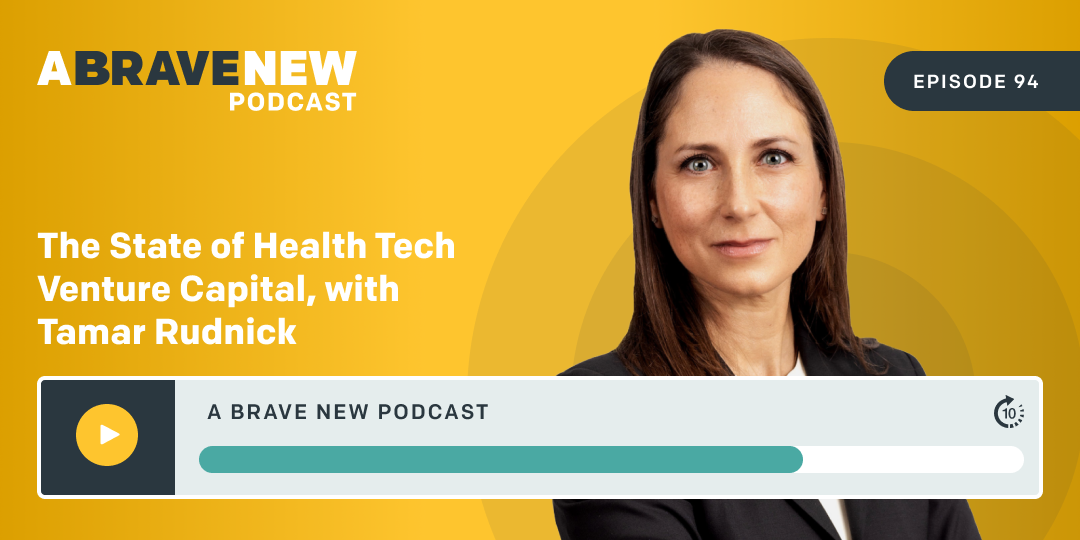Hunter Gatewood teaches individuals and teams how to build their dream team through tactical moves and healthy work relationships. His course “The Six Culture Builders for Team Leaders” is the shortest and most encouraging leadership program out there for people who lead from the middle of their organization. His experience includes work as a social worker and coaching change management and process improvement for 200+ work teams.
What you’ll learn about in this episode:
- Hunter’s unique approach to coaching mid-level leaders in organizations to build strong and resilient teams
- Why trust is a vital component of any high functioning team
- The freedom that comes within a team to constructively disagree and push for better results is when the team is operating in a high-trust environment
- What to look for to determine if your team lacks trust & how that relates to crabs in a bucket
- Specific how-tos that you can put in place with your team to start building trust now
Additional resources:
Transcription:
Intro: Welcome to A Brave New Podcast, the podcast all about how big ideas, brave thinking, and marketing smarts, help businesses grow. Here is your host, Josh Dougherty.
Josh: Hello, and welcome to A Brave New Podcast. My name is Josh Dougherty, your host, and I am so excited to have you join me again today for an episode. Today, we're going to speak with Hunter Gatewood. Hunter Gatewood leads Signal Key. They're a consulting organization, really an education organization, that works with mission-driven organizations to help their teams perform better. He shows up teaching courses, doing coaching, and as a keynote speaker. And he has, really, a wealth of information to share about his experience working in healthcare and in mental health and how he brings that experience to bear on helping organizations perform better. So without further ado, I want to introduce Hunter and bring him into the conversation. Hi Hunter. Thanks for being on the show.
Hunter: Hey, Josh. Really good to be with you. Happy to be here.
Josh: Cool. I'd love for your audience—obviously, we've talked a great deal about this—but tell the audience a bit about your background and the work you're doing right now.
Hunter: Yes. I am a social worker. I came up in the mental health and homeless services world of San Francisco. And so my background is in that part of healthcare. From that, I got really interested in all of the systems for social services, healthcare, specialty, hospital, jail services. A lot of my clients went in and out of jail. They had all these different needs, and I became interested in how—in that rich, liberal city where we really did have all these different services,—how the pieces did and, mostly, did not work well together for my clients, who had every need in the book.
And so that got me interested in learning about systems thinking, which got me into the next phase of my career, which was working on large change initiatives in healthcare. I'm old enough that I was around to help when healthcare was, maybe, the last industry on the planet to move from paper records to electronic records. That was a huge transformation, very challenging, very intricate, very complex, very high risk. So I got to work on initiatives on that or initiatives on making sure that everybody within a certain large primary care practice who has diabetes got all their care. And we followed up with people that fell through the cracks, who we hadn't seen and helped their blood sugar be healthy and helped them with education.
I got to learn a lot about what worked and what didn't in work teams on the ground, doing the complex important work of healthcare in working together to get results. And that led me to what I'm doing now, which is teaching courses on leadership, focused on people in the middle of the organization, VPs, directors, managers, supervisors, and also ... courses and coaching for that group. And then teaching, also teaching about leadership as a keynote speaker, which is how you and I know each other through our public speaking course we just completed.
Josh: Totally. I'm interested to dig a little bit more into the courses and coaching, because you bring all that background, all that history that you have working with so many different teams, coordinating complex projects. What do you think that experience has brought to the way you do your courses and your coaching to help make them a unique experience for the people that you're working with?
Hunter: Well, what's unique about my ... one thing unique about my courses in coaching is it really is targeted to the middle managers. There's so much, really great leadership development programs, training coaching for the, maybe the top, the C-suite for sure. And then maybe the next 10 or 20 people that work closest to the C-suite in New York chart. But of course there's so many people in the middle, the larger the organization gets, it gets to be very expensive. So those people don't usually get, there's not a lot of leadership programs out there specifically for those people. So that's unique.
I also say, I've been able to get away with it, I think it's true that my public course that I offer to anybody that I run every fall and spring, the six culture builders for team leaders, for these middle managers, it's the shortest leadership development course out there. Pretty sure that's true. It's only eight weeks. So that's unique. And we learned that we can get really deep and change people's mindsets about leadership and what their opportunities are, help them get practice in new leadership habits, new leadership skills in just eight weeks. So that's something that I'm proud of.
And then the third thing is I made a conscious decision not to get ambitious in terms of creating a special language, a special lexicon, and clever metaphors that are very specific to my teaching and coaching. I wanted to use really simple words. So people see my model, they're like, oh yeah, I know all that. Like I know about ... I know that humble leadership is a thing we should be doing. I know that it's important to set goals with my team. And those are some of my culture builders. What people haven't spent the time to do is to figure out how all those things connect to one another and to actually practice them.
So knowing and doing are two very different things. So I think just keeping it real simple and accessible to people with different education levels, different levels of experience, who are newer to middle management, or who've been in middle management for 20 years, just keeping the language simple and clean where people can point to and say, oh yeah, I know something about that already. That's something that's unique and was a bit of a risk when I put things out there as this branded product, so to speak, for people.
Josh: Yeah. Have people responded well to that? I'm interested to hear the simplicity, does it draw people in?
Hunter: It does draw people in, it does trigger some know-itallism in people. And so I have had conversations with bosses. Bosses will put three people in my course at a, at a pop. Which is great. I like it when people work, people ... they work in large management teams. They work through in groups of threes and fours. Or I sell a six-month version of the course that gets into other topics to an organization for 25 of their managers. When I'm doing that, when I'm selling it to the HR department, the big boss, we talk about why this is a good thing and why there is work to do here. Some people say, well, if I've heard all of the terms you're using, are you really offering anything special and new that's going to have an impact? And so I get to explain what I just said to you, to them. And so far, people have been willing to take the risk that there is something new, even though the language is familiar.
Josh: Yeah. I think that's something that's so common—in so many of the complex problems that we face and the challenges we face—is that the terms may be familiar, but it's how we synthesize everything together into meaningful change. That is the most important piece. I think that's something I've appreciated in any change management coaching experience I've had. And I know for you, like in your coaching work and your working on change management, you're working on healthcare process redesign. Even though the concepts may be similar, I'd love to hear what's maybe the most important factor that leads to success in one of those efforts?
Hunter: The question, so yeah, [inaudible 00:07:46] people taking ... There's the leadership action homework that I assign every week in the course, whether it's that or whether it's something in one of these giant change management, ambitious change management initiatives. The main success factor, willingness to price something in a different way. So that relates to work that requires feeling safe enough within the team to try a different thing with patients, or whatever kind of business people are in that I'm working with. We want to try something new and see how it works for the customer or the patient in healthcare, how it works for the team members.
And it's that classic thing of being willing to fail. And the way we do it with the leadership action homework in the course or with the change management process improvement curriculum, that's standard methodology that I have taught in the past, is you figure out how to do a little test safely, do it real small, maybe in one day. And then you reflect on how it works. So that breaking down the change and turning it into an experiment where we learn, and then you use data to learn, you track how it goes ... The little experiment includes lots of other success factors, but it really is feeling safe enough, smart enough, and supported enough—as an individual or as a team—to try something new and just see how it goes.
Josh: Yeah. Can we dig into that safety concept a little bit? Because I know you talk a lot about trust, right? And trust is really inherent to safety. So what's trust's role in all of this from your perspective?
Hunter: Thank you for that. Yeah. The speech you've heard pieces of, that I've worked on in the public speaking course, is all about the value of trusting teams, how trust can actually save you time in the team. And that comes from, like you said, the importance of trust and safety so that people can speak their brave ideas out loud and actually take a risk to be their full selves at work. We talk about everybody's work trying to figure out the best ways to turn diversity and inclusion efforts into more than just buzzwords in a few training sessions. How do you actually make that work with trust and safety? That's where that fits as well. The way we do that is you can ... The benefit, I'll just say a little bit about the benefits of trust. So the benefits of trust, it does, it makes it safe to try new things. It allows people to relax, I'm recovering, I know it all. I talk about that in my speech.
Josh: Yes. Same.
Hunter: Trust and safety allows us to admit that we don't know everything. Even if we're the boss, we don't know everything. That's not the boss's job to know all the answers. She may have to make most of the decisions, but it's not her job to have all of the answers. But for women, for people who are members of different minority groups—racial minorities and other kinds of minorities—it's even harder for those folks. When you think about diversity and inclusion in a team, it's harder for them to feel like they can let that wall down, let that guard down a little bit. And then trust and safety is what helps us drop that wall so that we can be a full team member, be our full selves at work. And again, share our ideas, take those risks without [inaudible 00:11:14] to get the results in the team and to actually approach the goals in an honest way where we're not competing with each other, and we're not trying to be the boss's favorite.
Josh: Yeah. Totally. You talked a little bit there and alluded to what a team without trust looks like: competition, trying to be the boss's favorite, all those different things. You dig a little bit into when a team is really operating at a high level of trust, in what looks different. Obviously there's some of that risk taking, willingness to take chances, willingness to be your full self as you show up, but are there other things that you see in a high trust team that you think are valuable?
Hunter: Hopefully everybody has at least that one person in their team that they vibe with, they have a strong level of trust. So let's think about that as a one-to-one thing. First, so in a one-to-one relationship with someone you trust, you go to them when you need help. You make a lot of good assumptions with them, you don't have to go into the details. You're not approaching every conversation feeling defensive, having that wall up. You can take what they say on face value, there's no competition, there's no politics. They're not trying to undermine you. They'll give you their real opinion. They'll support you when you take a risk. There's no drama between you. You're not second guessing each other. So the idea is that, if we make it our job as a leader to work on trust in the team, we can actually take what's ...
We can assume that most of us have at least one other person. And just imagine that, really see that, multiply it across everybody in the team. So everybody has everyone else's best interests at heart. A group that I'm coaching right now, I'm coaching a group of five directors in a large healthcare organization as a team and group coaching. And one of their goals is to be the A team. They are each other's A players, they are each other's most trusted allies and supporters, even though they work across different departments.
And even though they have teams upon teams that are in their management line below them in the org chart, it's the directors that are the A team. So you get that confidence when things go crazy, when the pandemic starts, when there's all these big external changes, there's always going to be changes we can't control in the environment. But when the team has trust, that team becomes the anchor. And that's what we turn to. That's where we get our strength. And that's how we make it through, its because of the team, because of the trust.
Josh: Yeah. I love that. And I think opportunities like the pandemic, you've probably been dealing with a lot of people who have gone through extreme hardship trying to survive the last two years, provide amazing services, especially in healthcare and mental health areas. It's just been struggle after struggle. I think something that comes up often in those high pressure situations are these differences of opinions or where people have different opinions. No one really knows what the right direction is to go, and they're working through challenges and disagreement comes up. How is trust in that moment of disagreement or difference in opinion a positive thing versus something that detracts from how the team is doing their work?
Hunter: Great question. The way you just talked about that scenario and trust, that's why trust really matters. That's why we need trust the most. One is that, if we have a high level of trust, you and I are on a team. And you said we're navigating something where there is no ... we don't know the perfect answer. There's no way to know the answer. We just have to start doing things together. We have to trust each other enough to take that step and just start working and figure it out as we go. That's where it's important for you to trust me enough that I'm not just trying to meet my own selfish goals, I'm not trying to get that promotion, I'm not trying to look smarter or better than you or other people in the team.
Trust helps us trust each other's motives and focus on the idea versus the person. So when we have disagreements, if you want to take ... if your best idea based on your experience and expertise is to go run off to the right, take the right fork in the road, and my best experience and expertise leads me to think, I want to go on off the left fork in the road. We can talk about the ideas, the reasons, we dig into why Josh wants to go right, why Hunter wants to go left and deal with a substance of that versus turning it into a power struggle, or Josh thinks he's smarter than me, or the boss always likes Josh better anyway. All these different things that come when you don't ... these things in the back of our heads that come out when you do not have trust.
Josh: Yeah. That's awesome. So maybe someone is thinking about this and they're thinking, oh my gosh, my team doesn't look like that, it feels very different. Do you have any tools, maybe, to help people diagnose or identify when their team ... I think people feel when trust isn't in their team? But, like, what are some of the things that you think about when you describe what a team without trust looks like?
Hunter: Yeah. So yeah, when I first start working with a team in my course or in coaching, I do like to do coaching in groups. Trust is the first thing I look for. And it is, you're right, once you know to look for it with other aspects of culture, once you say, okay, I want to understand how trust functions if there's trust here, because I now understand and I appreciate that trust is important. It's really easy to see it. There's a metaphor that I use in the speech that you've heard. And it comes from the fact that I'm from South Carolina, from a large family, and we ... my big family, multi generations, every August, I'm going this August, going in a couple months, like a month, it's only a month away.
Josh: Yeah. Crazy.
Hunter: We go to family beach week, there's three generations. We rent four houses at this point. It's like 25 people. On little Esso Island. And every week, the big group activity, well, besides karaoke at the one bar on the island, is crabbing. We go crabbing in the marshes at low tide and catch our blue crabs. And so when I see a team that doesn't have a lot of trust, that's the first thing I think of, is that bucket of crabs. Because in a bucket of crabs, there's different personalities, different behaviors come out. So if I'm thinking of a team ... if I'm in a team meeting, and there's not a lot of trust between the boss and the team members or the team members and each other. There's three basic crab kind of personas that I think of.
Number one is, most crabs in the bucket are just stymied. They're stuck, they're frozen, they don't know why they're there. They just are wishing it would be over and they're not trying to make eye contact. They're just stuck, they don't know what to do. They're just going to keep their head down and wait for all this to be over. That's the first kind of crab. And we see that a lot in teams without trust. They're not speaking up, they're not sharing their ideas. They're afraid to get shot down or afraid of the unhealthy competition in the team. That's one.
Number two, you've got people that are in an untrusting team. You've got people or in a bucket of crabs, you've got the crabs that are mad as hell. They're just grabbing at trying to pinch and snap at all the other crabs. I don't want to be here, this is crazy. I don't like this, this is stupid. This meeting is dumb. I'm smarter than everybody here. I'm the crab that was promised a corner office like, why am I ... I'm better than these people. It's competitive. It's just a bad vibe. Nobody wants to be on the team with that person. They're only looking out for themselves. They feel like they have to be better than everybody. So that's the angry crab.
And then the third one, the smart crabs are just trying to get out of there. The crabs are in the bucket, they're trying to climb the perfectly vertical sides of the bucket. They're never going to get out, but they're trying to climb the bucket. And that's what we see in teams. That's what we're seeing now is, in healthcare and in pretty much every industry, this is the big workforce turnover happening. I don't call it the great resignation, because most people aren't ... most people aren't sitting at home. Some people are taking a break because they're burned out. But most people are just going to jobs where they feel like the culture is a better fit or they can maybe make a little more money.
But this is a really big time for shifts in where people are working. And a lot of people who are leaving jobs are leaving a certain culture. They're leaving that bucket of crabs where there's not a lot of trust. They're going for something that better fits them, just how they want to work and the kind people they want to spend time with.
Josh: Yeah. I can really relate to that. I had so many friends who are moving on to something that's going to fill them up more in their day to day because it's been so hard. I love that metaphor because I think it takes away some of the heaviness of that talk and makes you smile as you're thinking about this. But it also brings up some really, I think serious, concepts and it allows you to reflect on yourself and be like, oh man, which crab am I in this situation. Do you-
Hunter: Right.
Josh: I mean-
Hunter: Right. Exactly. Yeah. First, am I in a bucket of crabs? Hopefully not. But most of us have been at different times or different meetings. But when I'm talking about the bucket of crabs and when I'm talking about teams and team meetings, I'm talking about the team we work with the most, our regular team. Where we're in contact with each other every day or very frequently and we do have opportunities to build that. And yeah, I'm glad you said that about the lightness, because we can all be jerks, none of us are perfect all the time. We all want that promotion at some point, we all want that raise. We all want and deserve to be recognized for doing good work. We all at some point think, actually, yeah damn it, my idea is the best idea.
Josh: Absolutely.
Hunter: I don't like anybody else's idea, my ... and we advocate for that. That's all very normal, very human. And there's ways that we can approach that in a team that promotes trustworthiness, promotes safety, and helps people trust us.
Josh: Yeah. So as people have, like, this aha moment. I'm going a little bit off script, so you can tell me like, I don't ... we can see how far we want to dig into this. But, like, I imagine as people are going through your course, they may have an aha moment and be, like, oh, I am in this situation, first. And then, oh, I fit this persona. I'm one of the angry craps. My therapist always tells me, Josh, when you're in a situation, you are the one who gets the opportunity to be the change. Change comes from, like, you starting to take a couple actions to make things different. Do you have, like, key first steps or things that you advise people as they're starting to realize maybe where they are in their team and what role they're playing in making the team dysfunctional? What are the kind of first steps that you have people think of to start making things better?
Hunter: Good question. There are a lot of ways to work on trust. I think it does. So, yeah. I like that idea of, hey, wait a second.,I'm the angry crab. I'm the one who's always advocating for myself or always feeling hurt if people don't like my idea. I take things personally, I tend to maybe even lash out a little bit. I think just figuring out that that's something that we're prone to do with certain people or in certain situations or maybe in general in the team, that's really helpful. Just understanding that is something that I do and, gosh, I do want to change how I am. If somebody angers a really strong emotion versus apathy, it also matters a lot.
Let's see, if I'm the angry crab, I would start with figuring out what that's about. Is it because I'm not being heard? Is it because I didn't get that promotion? I was coaching somebody recently who could not ... she had a really hard time giving up on the loss she felt—the disappointment that she didn't get the promotion that her good friend did. So it was her best buddy at work. And they were both going for the internal promotion to a higher, to the level of director, and only one of them could get it. And so the one who didn't get it, it really knocked her back, she was surprised, she was upset. And so we talked with her about what she can do.
What she could do short of leaving the organization. That was one option, but she did want to stick it out? And so a lot of it came with, she decided she wanted to give up on moving beyond feeling embarrassed. She was really embarrassed. She didn't like what she thought it said about her to the rest of the team—that she didn’t get the promotion but this other person did. So we talked through that. It wasn't coaching, not therapy but emotions do come up because, again, we're all human. We all have these things. So that's what she decided to do. She was going to give up on that embarrassment. She went out to lunch with her former best buddy at work and just talked about it and cleared the ground between them.
And she was able to come back with a better attitude into the team meetings and focus on setting her own goals. Because her goal was ... she didn't get the promotion goal, what was her goal? We talked about it like that. But usually there's something to, there's often something to let go of. If I'm the apathetic kind of stuck, frozen crab, where I'm just avoiding that, there could be just an experiment. Again, a small experiment in speaking up in a meeting or talking to your boss about why you don't feel safe speaking up in a meeting, talking about trust, saying, I don't feel safe speaking up.
I do have ideas, I'd like to speak up. Can you help me with the facilitation of the meeting? Or can we ... maybe I can go talk to the person—who seems like she always wants to shoot me down—these one to one. So there's some courage required to have some of these one-to-one conversations because we ... One thing, to increase trust, we don't want to call one person out in a group setting, we want to find a respectful, separate way to address whatever might be going on between two of us.
Josh: Totally. I love that concept of that self-reflection that you talked about at the beginning. Because I think it seems like, no matter where you are in a group, it starts with understanding what's motivating me. And then I can, once I understand that motivation—you're able to do all the things you talked about—maybe speak up, maybe do something else. But that self-reflection seems so important to the whole concept of understanding how to move towards a different type of action-
Hunter: Exactly.
Josh: ... Or engaging in a different way with your team.
Hunter: Yeah. One other thing I see that's really simple but really hard for most of us to do is just turning the page, just moving on. If we've worked in a team that doesn't have a high level of trust or if there's one person we're always at odds with who we feel like is always competing with us or not supporting us, there could be something that happened three years ago that we're still holding on … because trust, trust is hard to gain, it's hard to win, and it's easy to lose. Trust matters because trust is a decision that every individual makes.
So that's the thing about leading for trust. It's really hard, because we can't make people trust us, we can't make people trust the team. It's not like an action movie where you know the Rock or whoever grabs your hand at the top of the burning building and says, trust me and you just jump. I mean, maybe if we were at the top of a burning building, we would. But trust is something ... It's said, you can't make somebody trust you, because we are always trying to protect ourselves. Sometimes we've been protecting ourselves from something that may not matter anymore. Or, maybe we can just reset and turn the page. And that really opens us up to just being happier and more successful in the team.
Josh: Yeah. That's super insightful. So the last kind of question, before we start wrapping up, is around … You mentioned a little bit before about this turnover, people are looking for new jobs, new opportunities, et cetera. And if someone is that mid-level leader in their organization, they've worked really hard to build a team, they have talented people on it, they want to keep their people. How does that cultivation of trust help guard against that turnover that everyone is facing?
Hunter: Good question. Yeah. And that's what a lot of ... In the courses I teach and the coaching I'm doing now, that's what everybody is trying to guard against. They don't want their good people to leave and [inaudible 00:28:11] themselves, I don’t want them to feel they have to leave. It's a lot about burnout and reducing the negative turnover. Trust and focus on, acknowledging that trust is important, focusing on it, making your job to work on trust, that pays off. Because as trust builds, the walls come down, people feel safer at work. There's that connection, that safety within the team and that creates loyalty that people feel.
And so when people are ...I've had people who've taken my course in the past couple years during the pandemic and they've said, a lot of my other friends, not of my work friends, but my other friends they're changing jobs right now. I'm going to stick in this team because I know people a lot better. When you work on trust, you automatically get to know people better. So those connections are stronger. Loyalty happens. The team, again, starts to become the anchor, like I mentioned before. So the team becomes the source of safety.
Pandemic is still going on, there's all these crazy changes going on in the world. The overturn of Roe v. Wade just last week is sending huge shock waves through healthcare and just people's personal sense of their civil rights. So all this stuff is happening, but I know my team is someplace where I feel safe. So why would I want to change jobs right now? Because, I don't know, I've invested in trust, I've invested in safety. I've achieved that. I love these people, love is something we don't often ... That word love is interesting to think about in terms of the workplace. But there is a version of love that we can have for our coworkers and our teams that does help us stick with a boss, stick with the team, stick with an organization.
Josh: Yeah. Nice. Such an important topic right now with all the upheaval. It's been a heavy week, I know for my team, and it's been great that people have felt safe enough to bring up how much they're challenged by it. Because that means, hopefully, we're doing something right as an organization, that we can talk through and be like, my gosh, I can hardly get through the day here because of some of the decisions that have been coming down.
Hunter: Yeah. I would say that's definitely a really good indication. That's a really good indicator of trust and safety for sure.
Josh: Yeah. Well, the last question I love to ask people is the question I ask everyone is, like, really, what do you consider to be your superpower? You have a lot of talents, you've done a lot of things. What do you think is that superpower for you?
Hunter: I think it's connection. I'm a chatty person. I'm from a, like I said, I'm from a small town in South Carolina. I'm also a preacher's kid. My dad was one of the local ministers in the small town. And so I grew up at church, multiple, like, I don't know, dozens of grandparents kind of thing, unofficial grandparents running around. My two siblings and I were always with people in social situations who were chatty, gregarious people. So just the gift of gab helps with the connection. My social work background and training helps me to establish connections fairly easily on the terms of the person I'm talking to.
So I'm proud of the fact that I can talk to lots of different kinds of people, from some dude in jail, to a CEO with his thousands of employees. So that's something that I'm proud of and definitely helps me in my work, because as we talk about leadership, it's very personal. Leadership is personal, it's social. And to establish connections, especially in a short course, like my standard eight-week course, I have to establish connections quickly in order for people to trust. There's that word again, trust me, and listen to me, and actually grapple with the content that we're talking about.
Josh: Yeah. Awesome. Well, I think what you're doing and what you do on a day-to-day basis is so important and so helpful. And also, I know we have a lot of people in the healthcare space that listen to the podcast. And I'd love for you to share a little bit about the different ways that people can benefit from your expertise and where they can learn more about it. Because I think, obviously, you're doing super important work and you're good at it. So I want to make sure we can connect people together that have succeeded.
Hunter: Thank you. Yes. So people can find me in a few different places online. LinkedIn is ... I'm fairly active on LinkedIn. A lot of people roll their eyes at LinkedIn. I've managed to find a good corner of LinkedIn with lots of smart, supportive people. So Hunter Gatewood at LinkedIn. And my website, so my company is Signal Key, signal like a traffic signal, key like a door key, all one word, signalkey.com. There's blogs there. I blog every two weeks. Every blog comes with a doodle, that's part of my connection, my informal, casual approach to leadership and teaching. There's little stick figure doodles that I do for every blog. We use those in my courses.
I just realized, probably about 10 years ago now, that I really, really hate PowerPoint. And so I just realized I could stop using it. So I did. So people enjoy the break from PowerPoint in my teaching. But anyway, blogs come with doodles. Special bonus, you can get on an email list on the website for that. And I do have a new ... and there's a page about the upcoming course and coach community on the website as well. I do have a new monthly, free support series for leaders. That's starting in July, called Recharging Station. And it's with a colleague of mine, Rebecca Bromberg, who teaches mindfulness at work.
They’re 45 minutes, drop in, free, once a month, on the second Monday—starting your week off right at the Recharging Station. And there's a leadership tidbit. Some of the things I've talked about with you just now will come up, but there's a short little leadership lesson, short little bit of discussion, and then a guided mindfulness meditation on the theme of, for example, giving up on perfectionism because we're talking about humble leadership connected to the leadership idea. We [inaudible 00:34:44] for that, I'm excited to do that. And again, that's free and people can see the link for that on my website as well.
Josh: Awesome. Well, thanks for sharing that. Thanks for how you're showing up in the world too. It's such an important work I think that you're doing. And yeah, thanks for giving me some time and being on the show, I really appreciate it, Hunter.
Hunter: I appreciate the opportunity to chat with you and your audience and yeah, it's fun to see you in your office and yeah, really good to continue our connection this way.
Josh: Absolutely. Well, that's all we have for this week. I hope that you will enjoy the episode and join us again for our next one. See you all later.
Outro: Thanks for listening to this episode of A Brave New Podcast. Go to abravenew.com for more resources and advice. If you enjoyed this episode, show us some love by subscribing, rating, and reviewing A Brave New Podcast wherever you listen to your podcasts.
Similar Articles
OCT 11, 2021

The Beginner’s Guide to Generating Inbound Leads
Marketing doesn’t have to be painfully intrusive, like getting yet another telemarketing call right when you sit down to dinner with your family.
OCT 11, 2021

The Beginner’s Guide to Generating Inbound Leads
Marketing doesn’t have to be painfully intrusive, like getting yet another telemarketing call right when you sit down to dinner with your family.

